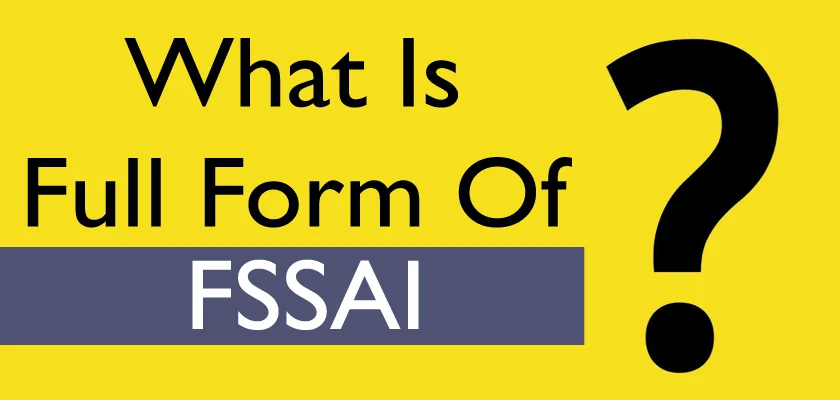Do you know what is the FSSAI Full Form? The full form of FSSAI is the Food Safety and Standards Authority of India. The FSSAI is a regulatory body that is responsible for assuring food safety, hygienic conditions, and quality in India. The Food Safety and Standards Authority of India (FSSAI), which was established under the Food Safety and Standards Act of 2006, controls the production, storage, distribution, sale, and import of food goods throughout the nation.
Table of Contents
What is FSSAI Full Form?
FSSAI – Food Safety and Standards Authority of India
What is FSSAI?
FSSAI stands for the Food Safety and Standards Authority of India. It is a regulatory body that ensures the safety and standardization of food products in India. FSSAI is responsible for setting up food safety standards, regulating and supervising food businesses, and promoting public health through food safety and nutrition education.
History of FSSAI
FSSAI was established on August 5th, 2008, by Dr Anbumani Ramadoss, a former Union Minister. It was established under the Food Safety and Standards Act of 2006 with the aim of ensuring that food in India complies with global standards of safety and quality. Manufacturing, storing, distributing, selling, and importing of food goods are all subject to regulation and oversight by the FSSAI. Through its efforts, the food business in India has become more competitive on a worldwide scale and consumers’ trust in food safety has increased.

Mission and Objectives of FSSAI
FSSAI’s mission is to ensure the availability of safe and healthy food for all, promoting public health and nutrition. Its objectives include setting scientific standards for food safety and hygiene, regulating food businesses and their practices, and creating awareness about food safety and nutrition.
Functions of FSSAI
FSSAI’s functions include setting food standards, regulating food manufacturing and processing, promoting food safety and hygiene, and conducting research on food safety and nutrition. FSSAI also provides training, education, and capacity building for food businesses to improve their practices and ensure compliance with regulations.
Documents Needed for FSSAI Basic Registration
To secure FSSAI basic registration, the following documents are required in India:
- Photo identification of the FBO
- Proof of identity such as Voter ID, PAN Card, Aadhaar Card, Driving License, Passport, Senior Citizen Card, etc.
- Form B (correctly filled and supported by the applicant)
- Summary of proposed food articles
- Certificate of Incorporation (COI)/Memorandum of Association (MOA)/Articles of Association (AOA)/Partnership Deed
- Proof of business premises like a lease or tenancy agreement
- Food Safety Management System (FSMS) plan
- Supporting documents (if any) like NOC from Panchayat/District, health NOC
- Summary of raw material suppliers
- Form IX
- Water test report from a NABL-certified lab.
- Import-Export code (IEC) issued by DGFT
- List of machinery and equipment present at the workplace
- List of partners and executives.
Procedure to Apply for FSSAI Basic Registration
To apply for FSSAI Basic Registration, follow these steps:
- Visit the FSSAI website and go to the “Registration” section.
- Click on the “Basic Registration” option.
- Fill in the Form B with the required details and attach the necessary documents.
- Pay the registration fee online.
- Submit the application form along with the supporting documents.
- Once the application is verified, the FSSAI will issue a registration certificate.
- The certificate can be downloaded from the FSSAI website.
FAQs- What Is The FSSAI Full Form?
Q.1. What is the FSSAI Full Form?
Ans. The FSSAI Full Form is the Food Safety and Standards Authority of India.
Q.2. When was FSSAI established?
Ans. FSSAI was established on August 5, 2008.
Q.3. What is the role of FSSAI?
Ans. FSSAI is responsible for regulating and supervising the manufacture, storage, distribution, sale, and import of food products in India.
Q.4. Why is FSSAI important?
Ans. FSSAI is important as it ensures that the food in India meets international standards of safety and quality, thereby building consumer confidence in food safety and making the Indian food industry more competitive globally.
Q.5. What are the different types of FSSAI registration?
Ans. FSSAI offers three types of registrations: Basic registration, State License, and Central License.
Thanks for reading What is the FSSAI Full Form? Bookmark our website Whatisfullform.com to know or read our collection of full forms.


